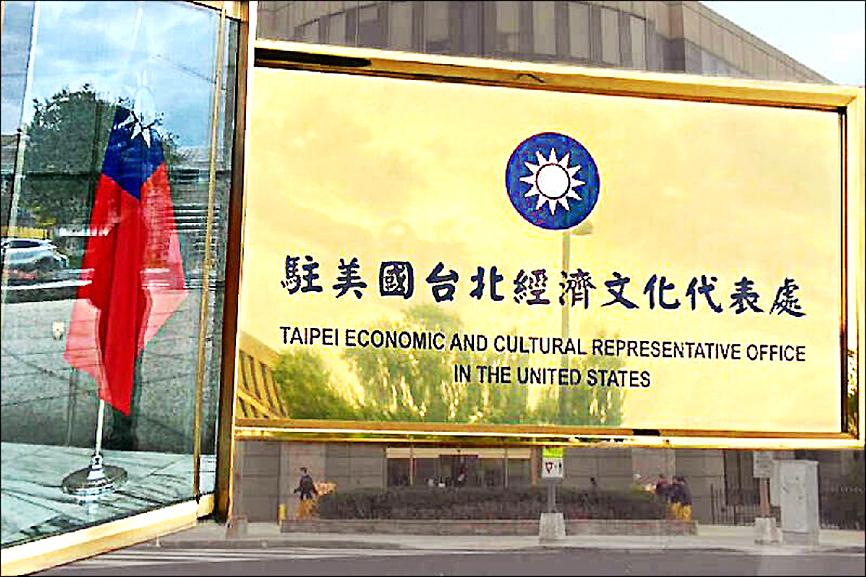A bipartisan group of US lawmakers on Thursday proposed matching bills in the US Senate and US House of Representatives that would require the US to negotiate the renaming of Taiwan’s de facto embassy in Washington as the “Taiwan Representative Office.”
The mission is currently called the Taipei Economic and Cultural Representative Office (TECRO).
Should the measures become law, any change in the office’s name could provide cover to smaller countries to take similar steps to boost engagement with Taiwan.

Photo: Lu Yi-hsuan, Tapei Times
It might also create a new rift in US-China relations, which are at their lowest point in decades, as Washington is seeking to push back against what it sees as Beijing’s growing economic and military coercion.
The US does not have official ties with Taiwan, but is its biggest international backer.
The bills would direct the US Secretary of State to “seek to enter into negotiations” with TECRO to rename its office as the “Taiwan Representative Office.”
US Senate Foreign Relations Committee Chairman Bob Menendez and US Senator Marco Rubio sponsored the Senate bill, with US representatives John Curtis and Chris Pappas leading on the House version.
“The US must make clear that, despite all efforts by the Chinese Communist Party to intimidate and coerce Taiwan, hostile powers have no right to claim sovereignty over democratic countries,” Rubio said.
Menendez told reporters that the bills were consistent with the US’ Taiwan Relations Act, which defines Washington’s unofficial ties with Taiwan, and demonstrate its support for the nation “to determine its own future.”
“We must take this step to strengthen our diplomatic partnership with Taiwan and counter China’s repeated attempts to threaten and coerce nations around the globe,” Pappas said.
In Taipei, the Ministry of Foreign Affairs yesterday expressed gratitude to the US Congress for its bipartisan support and the enhancement of Taiwan-US relations.
The White House, the US Department of State and China’s embassy in Washington did not respond immediately to requests for comment.
China downgraded its diplomatic relations with Lithuania and pressed multinationals to sever ties with the country after Taipei last year opened an office in Vilnius, bearing the name “Taiwan.”
Beijing calls Taiwan’s status the most sensitive issue in China-US relations and the basis for ties between the two superpowers.
Additional reporting by Aaron Tu, staff reporter

PREPAREDNESS: Given the difficulty of importing ammunition during wartime, the Ministry of National Defense said it would prioritize ‘coproduction’ partnerships A newly formed unit of the Marine Corps tasked with land-based security operations has recently replaced its aging, domestically produced rifles with more advanced, US-made M4A1 rifles, a source said yesterday. The unnamed source familiar with the matter said the First Security Battalion of the Marine Corps’ Air Defense and Base Guard Group has replaced its older T65K2 rifles, which have been in service since the late 1980s, with the newly received M4A1s. The source did not say exactly when the upgrade took place or how many M4A1s were issued to the battalion. The confirmation came after Chinese-language media reported

The Taiwanese passport ranked 33rd in a global listing of passports by convenience this month, rising three places from last month’s ranking, but matching its position in January last year. The Henley Passport Index, an international ranking of passports by the number of designations its holder can travel to without a visa, showed that the Taiwan passport enables holders to travel to 139 countries and territories without a visa. Singapore’s passport was ranked the most powerful with visa-free access to 192 destinations out of 227, according to the index published on Tuesday by UK-based migration investment consultancy firm Henley and Partners. Japan’s and

A Ministry of Foreign Affairs official yesterday said that a delegation that visited China for an APEC meeting did not receive any kind of treatment that downgraded Taiwan’s sovereignty. Department of International Organizations Director-General Jonathan Sun (孫儉元) said that he and a group of ministry officials visited Shenzhen, China, to attend the APEC Informal Senior Officials’ Meeting last month. The trip went “smoothly and safely” for all Taiwanese delegates, as the Chinese side arranged the trip in accordance with long-standing practices, Sun said at the ministry’s weekly briefing. The Taiwanese group did not encounter any political suppression, he said. Sun made the remarks when

BROAD AGREEMENT: The two are nearing a trade deal to reduce Taiwan’s tariff to 15% and a commitment for TSMC to build five more fabs, a ‘New York Times’ report said Taiwan and the US have reached a broad consensus on a trade deal, the Executive Yuan’s Office of Trade Negotiations said yesterday, after a report said that Washington is set to reduce Taiwan’s tariff rate to 15 percent. The New York Times on Monday reported that the two nations are nearing a trade deal to reduce Taiwan’s tariff rate to 15 percent and commit Taiwan Semiconductor Manufacturing Co (TSMC, 台積電) to building at least five more facilities in the US. “The agreement, which has been under negotiation for months, is being legally scrubbed and could be announced this month,” the paper said,